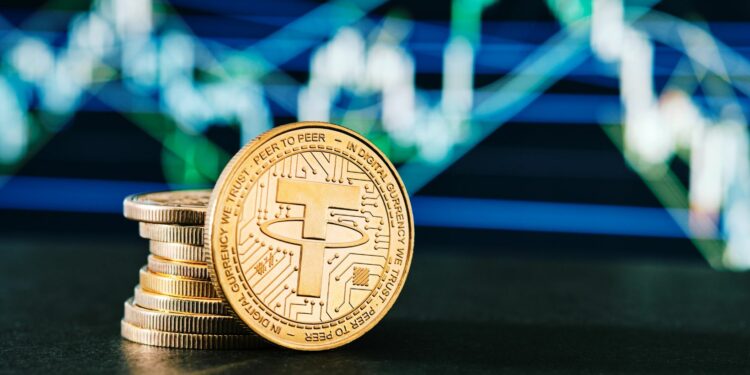Bitcoin is a type of digital money that many people are interested in. But it can be hard to know how much Bitcoin is really worth. That’s where something called Tether comes in.
Tether is another kind of digital money, but it’s different from Bitcoin. It’s what’s known as a “stablecoin.”
That means its value stays pretty much the same over time. Tether does this by connecting its value to regular money, like the U.S. dollar. People are increasingly realizing that Tether plays a big part in the world of Bitcoin. Let’s take a closer look at why Tether matters and what it could mean for the future.
Tether Helps Keep Bitcoin Steady
As earlier mentioned, Tether (USDT) maintains a stable value since it is pegged to fiat currencies like the U.S. dollar (USD). This coin is mainly popular among crypto investors and gamblers. Generally, most crypto gamblers in the US prefer using Tether to play casino games.
This is mainly because you don’t have to worry about the coin losing value due to market volatility. Luckily, most online casinos in USA support USDT deposits and withdrawals. As such, you can fund your account and play your preferred casino games using Tether.
Apart from maintaining its own stable price, Tether also keeps the price of Bitcoin from increased volatility. When the price of Bitcoin goes up and down a lot, it can make people nervous. They might worry about losing the money they put into Bitcoin.
This is where Tether can help. When Bitcoin’s price starts jumping around, people can trade their Bitcoin for Tether instead. They do this because they know Tether will stay at about the same value.

By trading Bitcoin for Tether, people can kind of “pause” their money. They don’t have to worry about losing value while Bitcoin is going through a rocky time. Then, when things settle down, they can trade their Tether back for Bitcoin. This helps keep the Bitcoin market a bit more stable.
Tether is the Biggest Stablecoin Out There
Tether isn’t the only stablecoin, but it is the largest and most popular. When we look at the market cap of Tether (that’s the total value of all Tether coins out there), it’s way ahead of other stablecoins. There are a few reasons why Tether has become so dominant. First, it’s been around longer than many of its competitors. That means people have had more time to get used to it and trust it.
Second, Tether is what’s called “liquid.” That means it’s easy to trade Tether for other things, like Bitcoin or regular money. This makes it super handy for people trading in cryptocurrency markets.
However, Tether is starting to face some challenges. New stablecoins are popping up all the time, and some people are worried about how Tether is run. There have been questions about whether Tether really has enough regular money to back up all the Tether coins out there.
How Tether Affects the Price of Bitcoin
This is a hot topic in the world of cryptocurrency. Many experts think that Tether has a big influence on the price of Bitcoin, especially when Bitcoin’s price is going up and down a lot.
Here’s how it might work: let’s say a bunch of new Tether coins are created and put into the market. If a significant amount of Tether is used to Bitcoin kopen (buy Bitcoin), it has the potential to positively influence and drive up the price of Bitcoin, benefiting the cryptocurrency market. Basically, it’s like a bunch of new money is suddenly being pumped into Bitcoin.
Some people even worry that Tether could be used on purpose to control Bitcoin prices. The idea is that if you have a lot of Tether, you could use it to buy a bunch of Bitcoin and make the price go up. Then, you could sell that Bitcoin for a profit.
However, this is all pretty complicated stuff. It’s not always clear exactly how Tether affects Bitcoin’s price. A lot more research is needed to figure it out for sure.
Tether’s Future in the World of Cryptocurrency
As of now, Tether remains the top dog in the world of stablecoins. But what does the future hold? Experts see a couple of possibilities.

In the future, Tether will stay on top. As more people and businesses use cryptocurrency, they might rely on Tether as a stable and trustworthy way to trade. Tether’s popularity could grow even more. But there’s another possibility, too. Governments might start putting more rules in place for stablecoins like Tether.
They might demand more transparency about how Tether is run and whether it really has the cash to back up all its coins. At the same time, newer stablecoins that are even more transparent and follow rules better than Tether might come along. This could make people trust those new stablecoins more, and Tether could lose some of its power.
In the end, it depends a lot on how well Tether can tackle these challenges. Can it stay trustworthy and reliable in the eyes of cryptocurrency users? Can it keep up with new government rules and compete with new stablecoins? The answers to these questions will shape Tether’s future and, with it, the future of the whole cryptocurrency market.
















